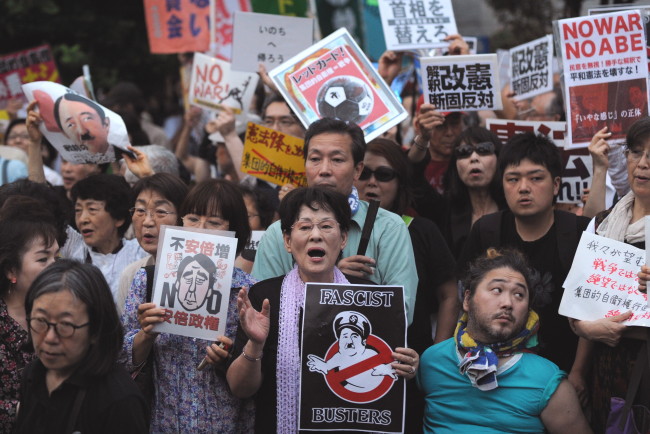Japan approved its right to fight in overseas wars on Tuesday, overturning its strictly defensive postwar security policy and defying public protests and international concerns over its unabated revisionist push.
Prime Minister Shinzo Abe convened an impromptu cabinet meeting to lift the longstanding ban on exercising collective self-defense by reinterpreting its Constitution’s war-renouncing Article 9, which barred Tokyo from waging war and possessing war-related materials.
With the decision, Japanese troops will be able to defend allies under attack even though they are not threatened themselves, yet with a minimum necessary standard. It will also likely facilitate their use of weapons in peacekeeping operations and participation in the U.N.’s collective security system.
The announcement marks a major shift in the country’s defense-oriented security policy that the nationalist premier has long sought in the face of China’s increasing assertiveness in the region and persistent North Korean threats.
“Japan faces a complex, grave challenge as the surrounding national security landscape undergoes a fundamental change,” the cabinet resolution reads.
“No country in the world can safeguard peace by itself; the international community also expects Japan to take up a more active role in a way that fits its national power.”
The document cited a series of scenarios for collective self-defense including a U.S. warship under attack at sea; interception of a ballistic missile heading toward the U.S.; and inspection of a foreign vessel in a contingency in nearby waters.
“While strengthening Japan’s own defense capabilities, it is imperative to boost the deterrence through mutual support with the ally U.S. and other friendly countries,” it said.
The constitutional reinterpretation is set to deepen concerns over a possible revival of Japanese militarism from the early 20th century that still haunts the two Koreas, China and other Asian countries.
Abe’s drive for a “normal state” has led to a plunge in the LDP’s approval ratings to below 40 percent for the first time, while fueling a series of rallies among politicians, scholars and civic activists across the country.
Yet his Liberal Democratic Party has managed to win support from the New Komeito Party, its coalition partner which initially expressed reluctance given opposition at home and abroad.
Shortly before the cabinet meeting, some 10,000 people reportedly staged a rally before Abe’s residence in downtown Tokyo, chanting slogans like “No need for the right to collective self-defense.” Another 200 protesters gathered in front of a LDP office in Osaka, calling for safeguarding the Constitution and a resignation of a “war-hungry prime minister.”
 |
People protest Japan’s move for collective self-defense in front of the Japanese Prime Minister’s official residence in Tokyo on Monday. (Xinhua-Yonhap) |
In a poll by Japan’s Mainichi Shimbun daily from June 27-28, about 58 percent of the respondents opposed the plan and more than 70 percent said that it could drag the country into overseas wars. A recent joint survey by the Nihon Keizai Shimbun and TV Tokyo also showed that around half of the respondents disapproved and only 34 percent endorsed the change.
With the public sentiment growing bitter, Japan pledged to remain a “proactive contributor to global peace and stability” committed to an exclusively defensive security policy.
Seoul appeared cautious about the decision, calling for Tokyo’s efforts to address its neighbors’ concerns and to boost transparency in the decision-making process.
“Any move that affects the peninsula’s security and our national interests cannot be accepted unless accompanied by our request and consent,” Foreign Ministry spokesman Noh Kwang-il told reporters.
“The right to collective self-defense does not entitle a country to exercise it in others’ territory.”
The move is seen as part of Abe’s push for a raft of revisionist foreign and security policies since he took office early last year. Last week, his administration unveiled a report undercutting its watershed 1993 apology for Japan’s enslavement of Korean women during World War II, sparking vehement criticism from Seoul and elsewhere.
Relations between the former foes are already frayed by festering territorial and historical feuds.
Washington, a staunch ally of Japan struggling with economic woes and budget restraints, displayed its support, saying the country has “every right to equip” itself when necessary.
“We encourage them to do that in a transparent manner, and we remain in touch with them about these important issues,” State Department spokesperson Jen Psaki said at a regular news briefing.
By Shin Hyon-hee (
heeshin@heraldcorp.com)








![[Weekender] Korea's traditional sauce culture gains global recognition](http://res.heraldm.com/phpwas/restmb_idxmake.php?idx=644&simg=/content/image/2024/11/21/20241121050153_0.jpg)